capacity defences
1/55
There's no tags or description
Looks like no tags are added yet.
Name | Mastery | Learn | Test | Matching | Spaced |
|---|
No study sessions yet.
56 Terms
Insanity
A special defence to a criminal offence. The d must be labouring under such a defect of reason from disease of the mind as to not know the nature and quality of the act he or she was doing or if he or she did not know it, that he or she did not know he or she was doing wrong.
Key elements of the insanity defence
Defect of reason- this means the defendant was unable to reason, not just that they failed to use their reasoning abilities
Disease of the mind - the defect of reason must be caused by a disease of the mind which is a legal term and not a medical one
Not knowing the nature of quality of the act- lack of understanding the d either did not understand the nature or quality of their actions or did not know that their actions were wrong
How the insanity defence works
Presumption of sanity
N’naghten rules
Special verdict- if d is found insane they will be found not guilty by reason of insanity
Alternatives to criminal conviction- if found insane the court may order a hospital order, supervision order or absolute discharge
Who is the burden of proof on for proving insanity
On the defense
DPP v h
Where d was charged with driving with excess alcohol it was held that insanity is not a defense to offences of strict liability as no mental element is required to be proved.
Defect of reason
Defendants power of reasoning must be impaired. If defendant is capable of reasoning but has failed to nurse those powers then this is not a defect of reason
Disease of the mind
The defect of reason must be due to a disease of the mind. Legal term not medical. Can be a mental disease or a physical which affects them mind.
Organic insanity is when the brain has been damaged by a physical cause such as epilepsy or a degenerative disease like Alzheimer’s.
Functional insanity is when there is no organic reason for the damage to brain
External factors
Where d is in a state where they don’t know what they are doing is due to an external cause. Does not amount to a disease of mind and so defense of insanity does not apply
Voluntary intoxication and insanity
Where d voluntarily takes an intoxicating substance and this causes a temporary psychotic episode the d cannot use d of insanity. - intoxicating substance is an external factor.
Not knowing the nature and quality of the act
2 ways d may not know
Bc they are in a state of unconsiousness or impaired consiciosness
They are conscious but due to there medical condition do not understand what they are doing.
D must prove either of these statements for m’nagten rules
Where d knows the nature and quality of their act they can still use d of insanity if they did not know what they did was wrong-legally
Insanity and unfitness to plead act 1991
If d charged with murder but finding of insanity the judge must impose an indefinite hospital order. Hospital can only release with permission of Home Secretary.
The special verdict
Where proves insanity jury must return a verdict of not guilty by reason of insanity.
Judge can then impose
A hospital order, a supervision order or an absolute discharge
Automatism
The defense to a criminal offence. It is an act done by the muscles without nay control by the mind, such as a spasm, a reflex action or a convulsion or an act done by a person who is not conscious of what he or she is doing such as an act done while suffering from concussion or while sleepwalking.
Insane automatism
Where the cause of the automatism is a disease of the mind within the m’naghten rules and comes within defense of insanity.
Non insane automatism
A complete defense where the cause of the automatism is external.
Non insane automatism
Actus reus is committed involuntarily and d doesn’t have men’s rea. Cause of automatism must generally be external to the d such as a blow to the head, an attack by a swarm of bees, sneezing fits etc
Hill v Baxter 1958
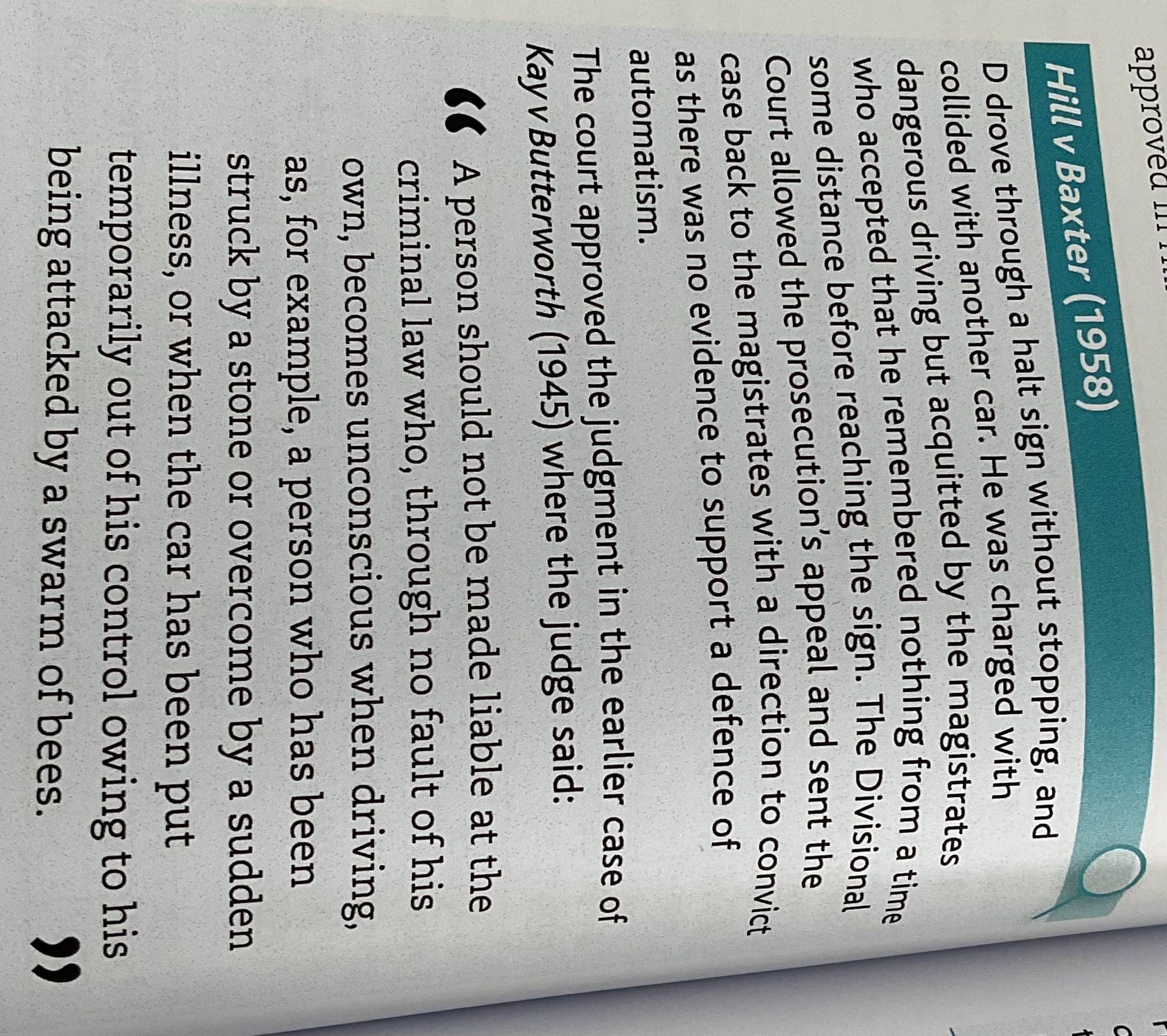
R v T 1990
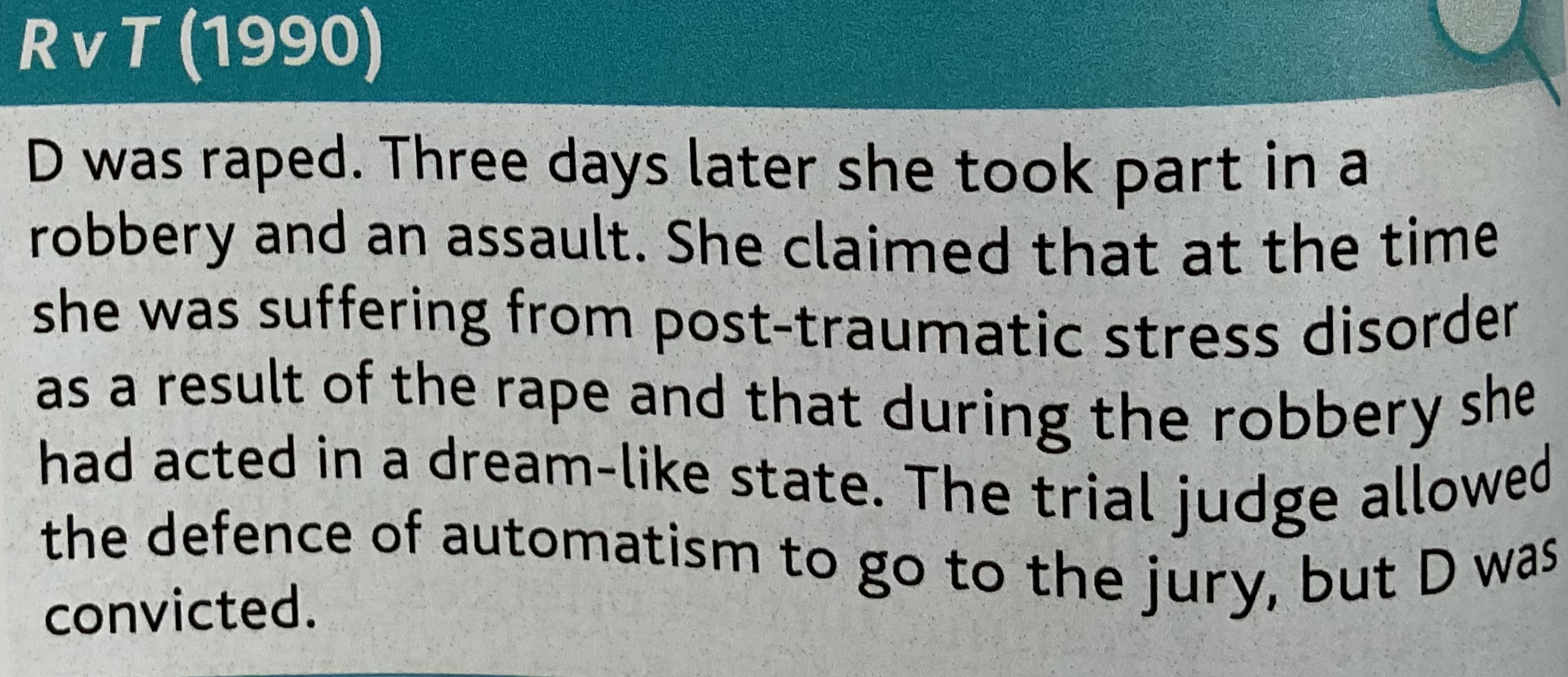
Attorney generals reference no. 2 of 1992 1993
There has to be a total loss of voluntary control. A reduced or partial control of ones actions is not sufficient to amount to automatism
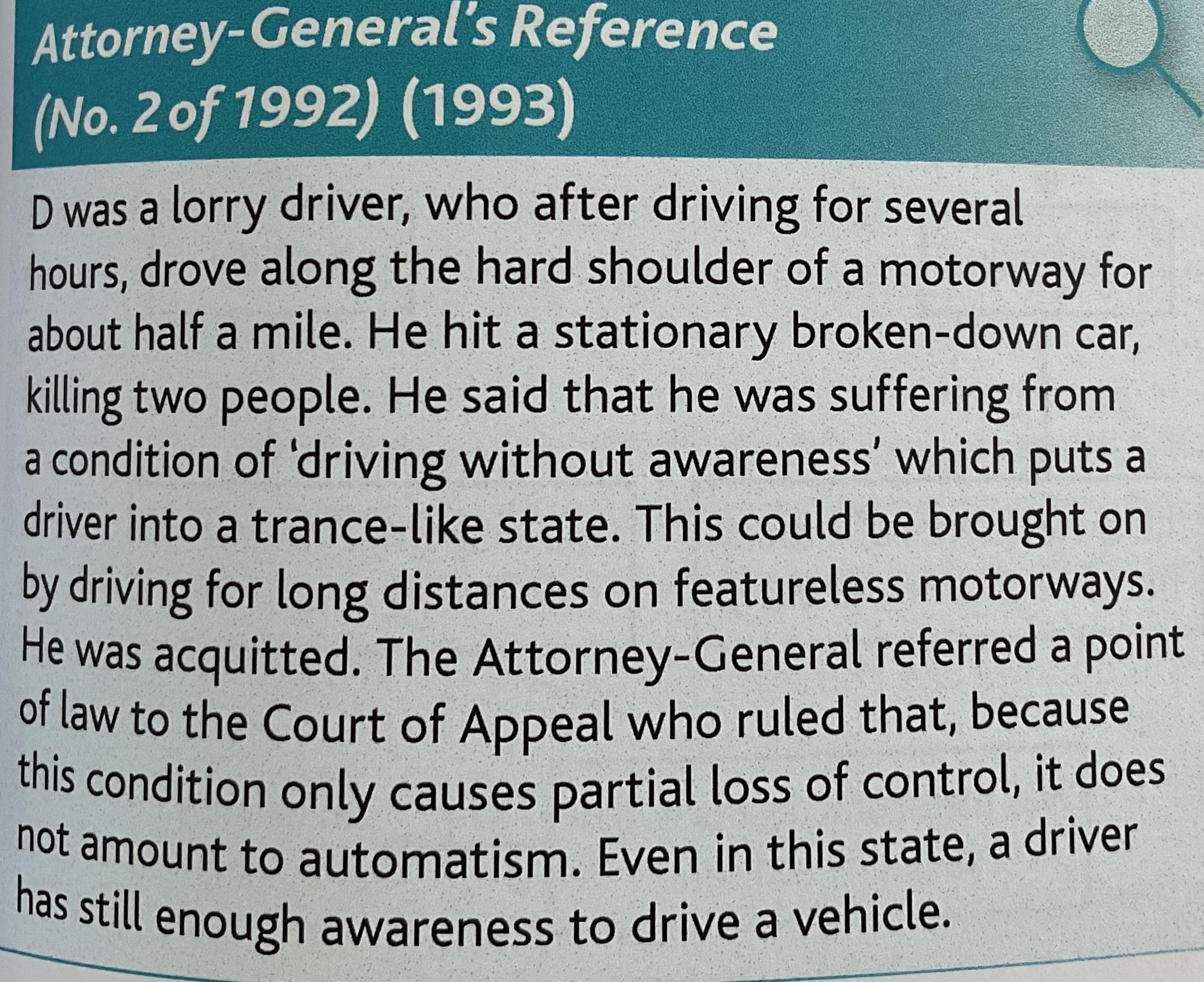
Self induced automatism
Where d knows that his or her conduct is likely to bring an automatic state. E.g a diabetic knows the risk of failing to eat after taking insulin
Specific intent offences
Offences for which the men’s Rea required is only intent. These offences include murder and s 18 OAPA 1861. For both these offences the men’s Rea is intent only.
Basic intent offences
Offences where recklessness is part of the men’s Rea. Includes manslaughter, as 20 and 47 OAPA 1861 and some property offences such as criminal damage
Automatism from voluntary intoxication
Not a defence
E.g coley 2013
-d had been taking cannabis which led him to attack his neighbours argued automatism. Coa dismissed the argument as he was nit acting wholly involuntary as he was bale to dress himself in clothes and use keys to enter neighbours house and b because he has induced his condition by voluntary intoxication
R v McGhee
D suffered from tinnitus took temazepam and drank alcohol. Charged with s47 and s18 offences against shopkeepers but claimed he had no recollection of assaults. Court ruled that even if he had been in a state of automatism the d would have failed on the grounds that he induced it through his voluntary fault- had voluntary drunk and had temazepam - was well aware of the risks
What happens when unanticipated consequences happen as a result of perfectly appropriate action
The d of automatism can be used fro both specific and basic intent offences.
What if the automotive state results from improper action
Automatism will be a defence to specific intent defences but cannot be a d fro basic intent offences
R v bailey 1983
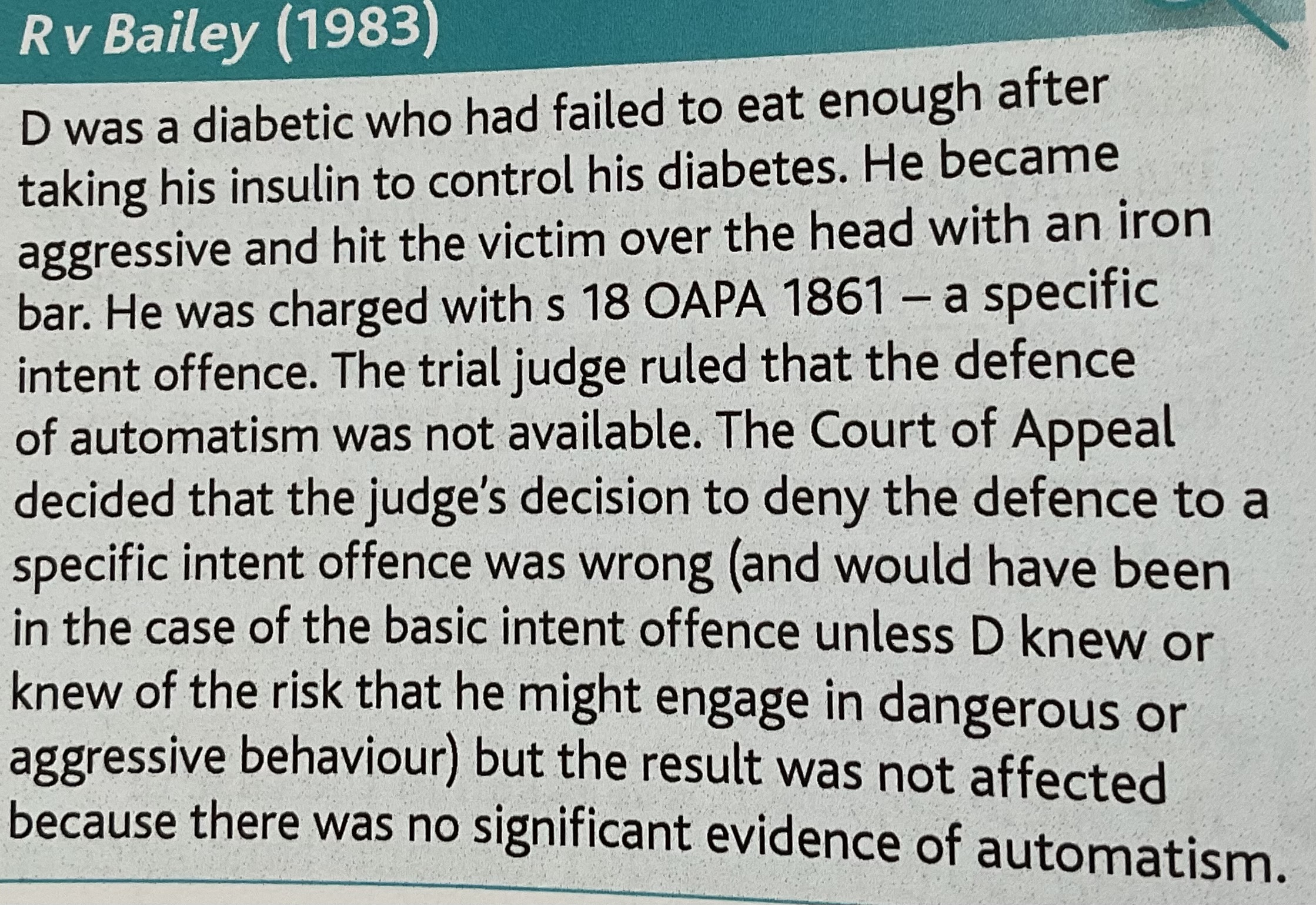
R v Hardie 1984
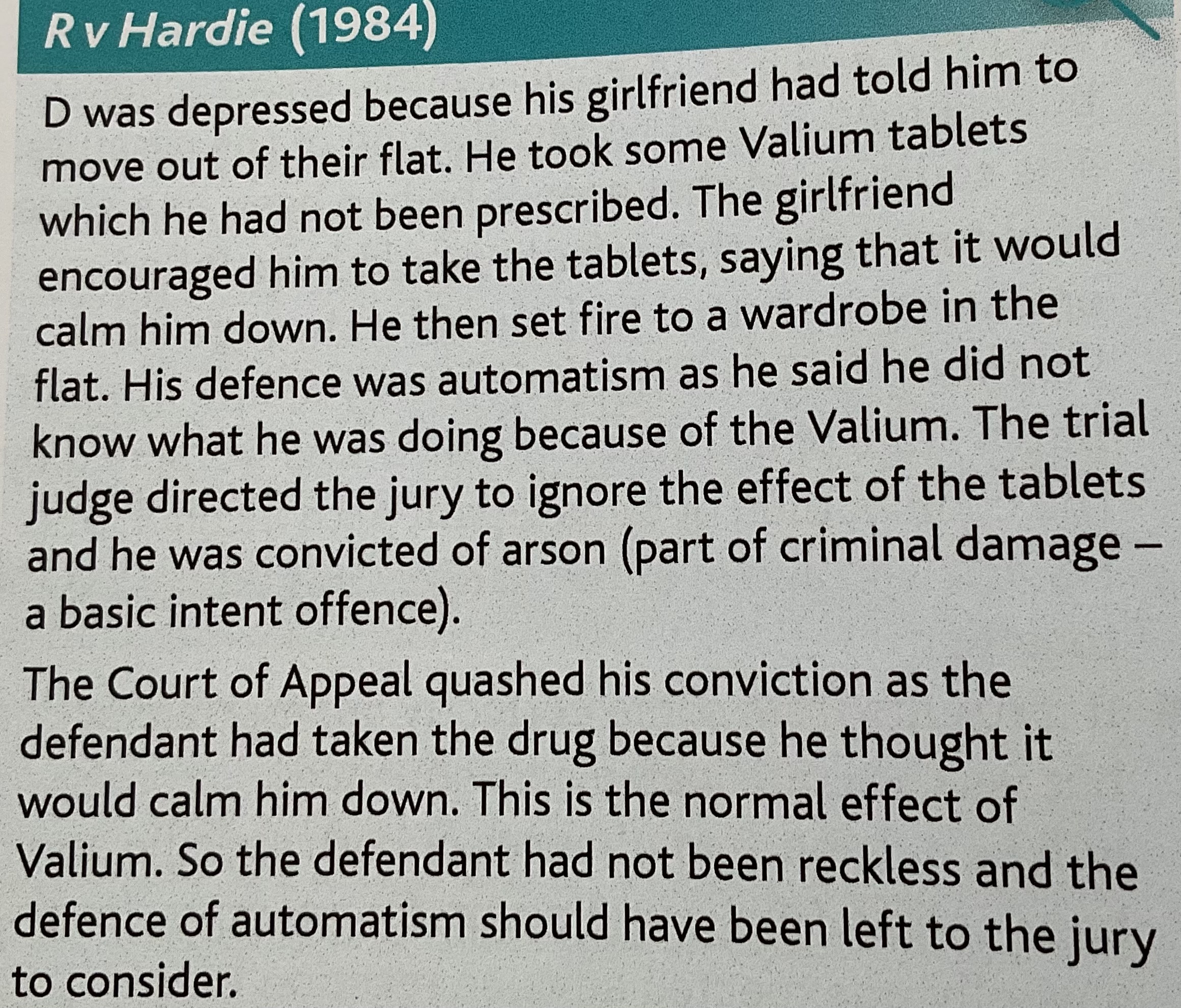
Intoxication
Must prove that the d was so intoxicated that they were incapable of forming the men’s Rea of the offence.
Wether the d is guilty or not depends on wether
The intoxication was voluntary or involuntary
Wether the offence charged is one of specific or basic intent
Specific intent
Requires a deliberate and purposeful intention to cause a particular outcome
E.g murder theft, robbery
Prosecution must prove that the d had the specific intention or goal when commit in the offense.
Basic intent
Requires a less demanding mental state such as recklessness or negligence to establish the necessary men’s Rea
E.g assault, battery
Intoxication- self induced intoxication generally cannot be used as a defense to basic intent crimes as its assumed that the d was reckless in becoming intoxicated
Voluntary intoxication
Where d has chosen to take a substance or knows the effect of taking a prescribed drug will make him intoxicated
From Sheehan and Moore the test is that because of the intoxication the d did not form the intent
Where there is an alternative basic intent offences the d may be charged with both a specific intention defense and a basic intent defense and left to jury to decide if they have the intent for specie intent
But not every offense has a fallback option
When a d has the necessary men’s Rea despite their intoxicated state they are still guilty
R v Sheehan and Moore
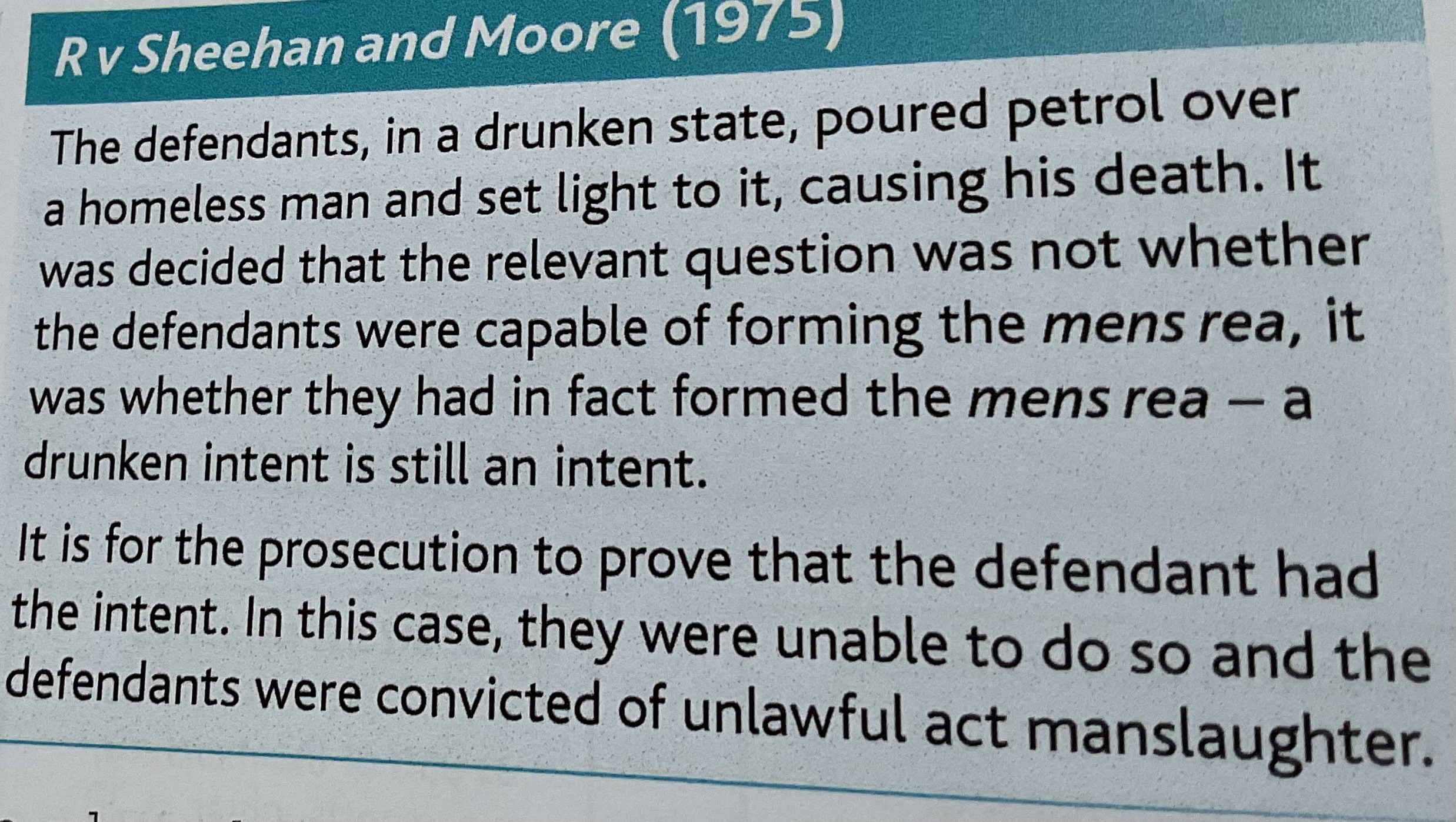
R v lipman 1970
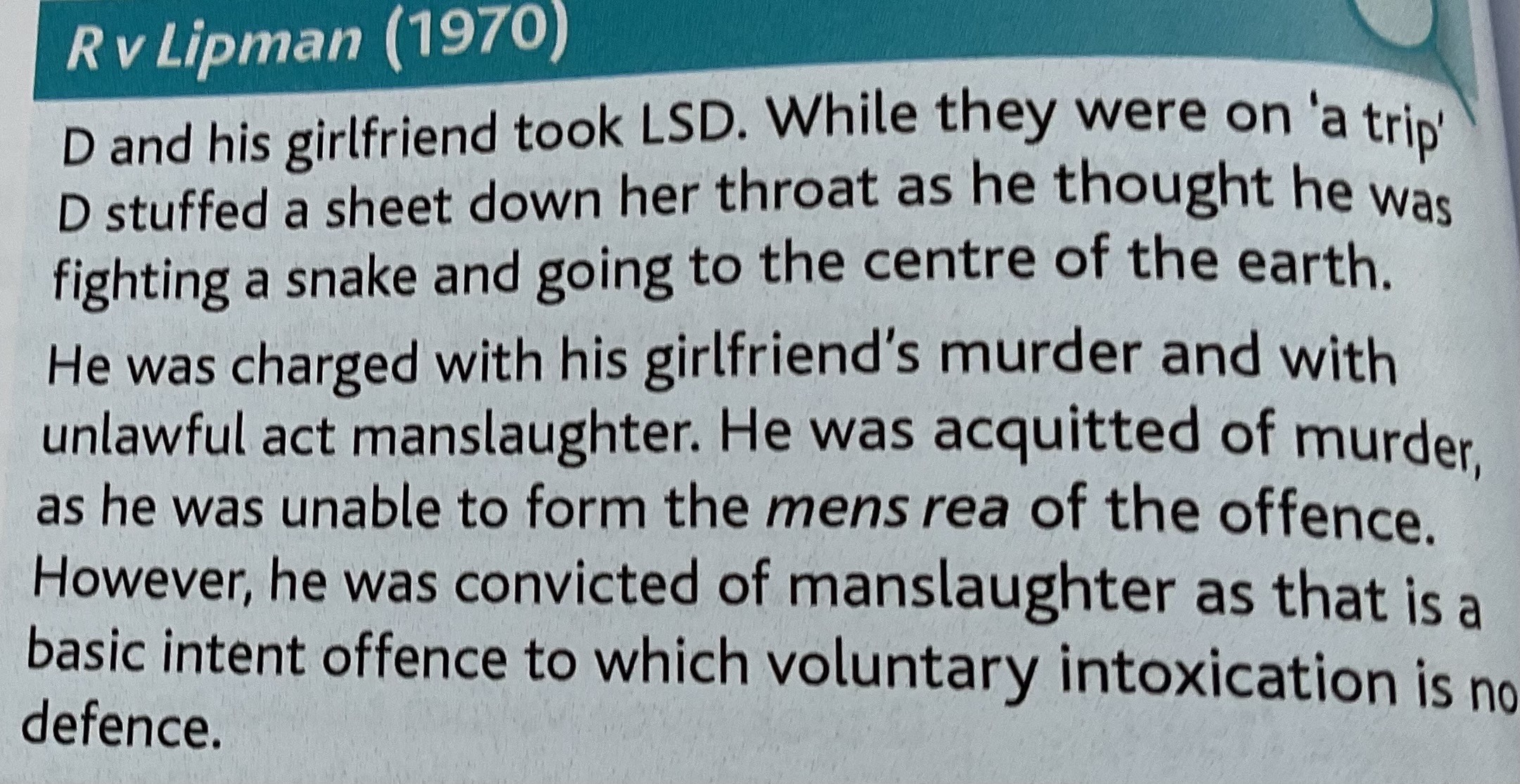
Attorney general for Northern Ireland v Gallagher 1963
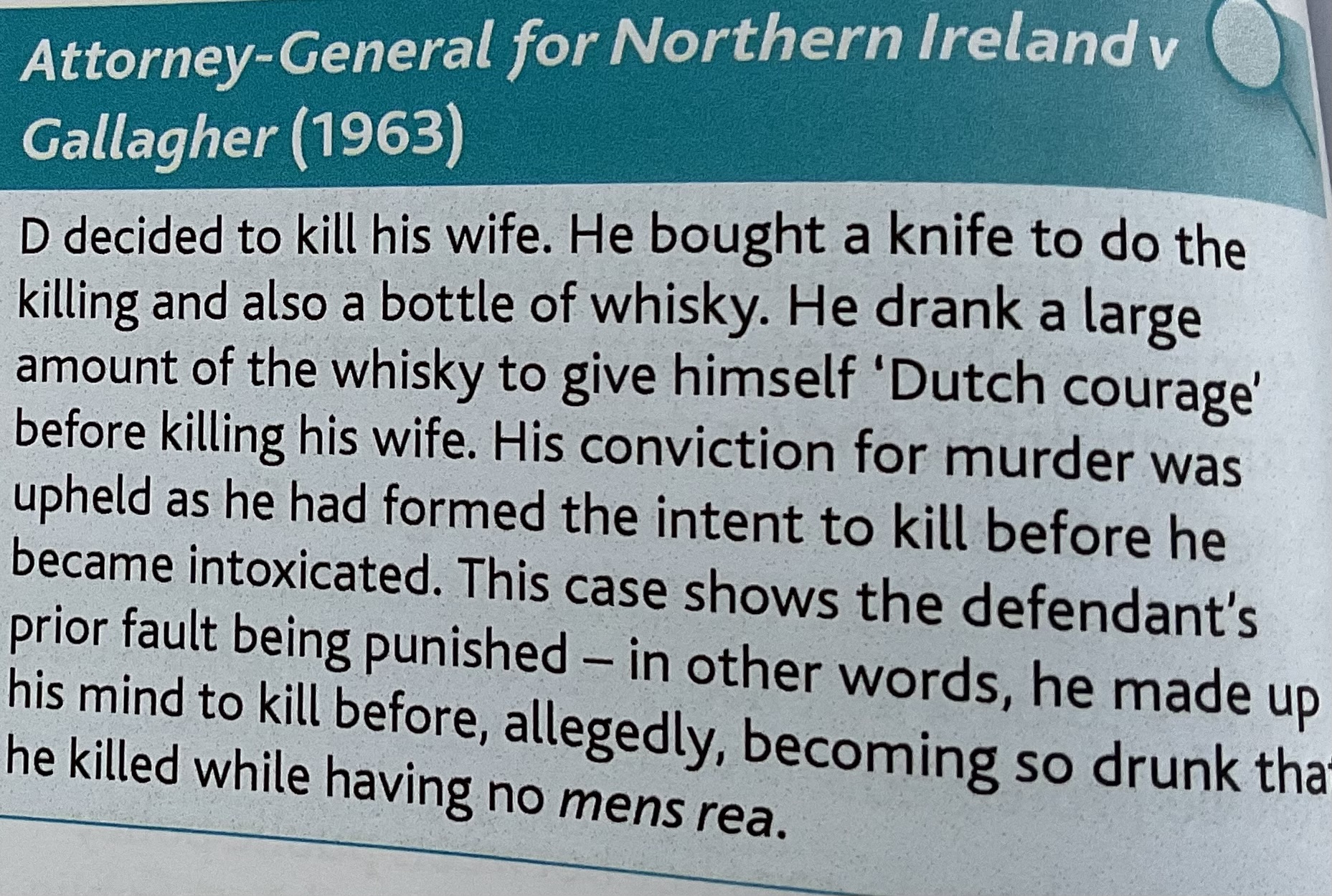
DPP v majewski 1977
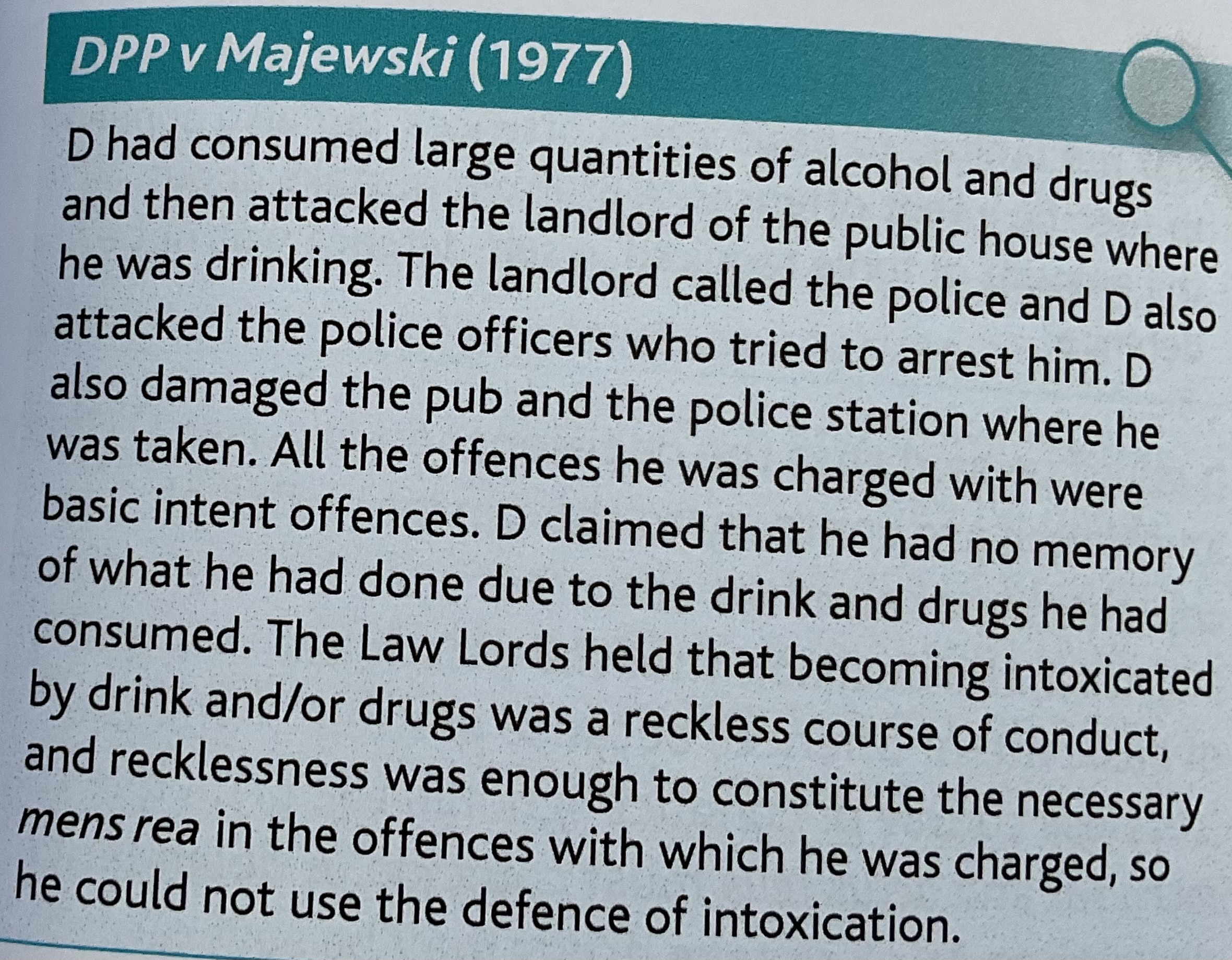
Voluntary intoxication and basic intent offences
For basic intent voluntary intoxication if not a defense. Becoming intoxicated is reckless and recklessness is enough fro men’s Rea
BUT if d does not realise the strength of the substantive then can still be a defense
R v Allen 1988
D drank some homemade wine which had a greater effect on him than expected. While under the influence of this wine he committed sexual assaults. He claimed that he was so drunk he did not know what he was doing and had not voluntarily put himself in that condition as the wine was stronger than he realises
Decided that his intoxication was still voluntary but sexual crime is basic intent offences and so unable to use intoxicated state as a defense.
Involuntary intoxication
Covers if they were spiked or where a prescribed drug has an unexpected effect and d does not realise its effect.
If d was not intoxicated through no fault of their own
-they are allowed to argue that they did not form the men’s Rea wether it is specific or basic intent offences
But if th prosecution can prove that they did form the men’s Rea then they are guilty of either specific if or basic intent even if they wouldn’t have committed the crime without being involuntarily intoxicated.
R v Kingston 1994
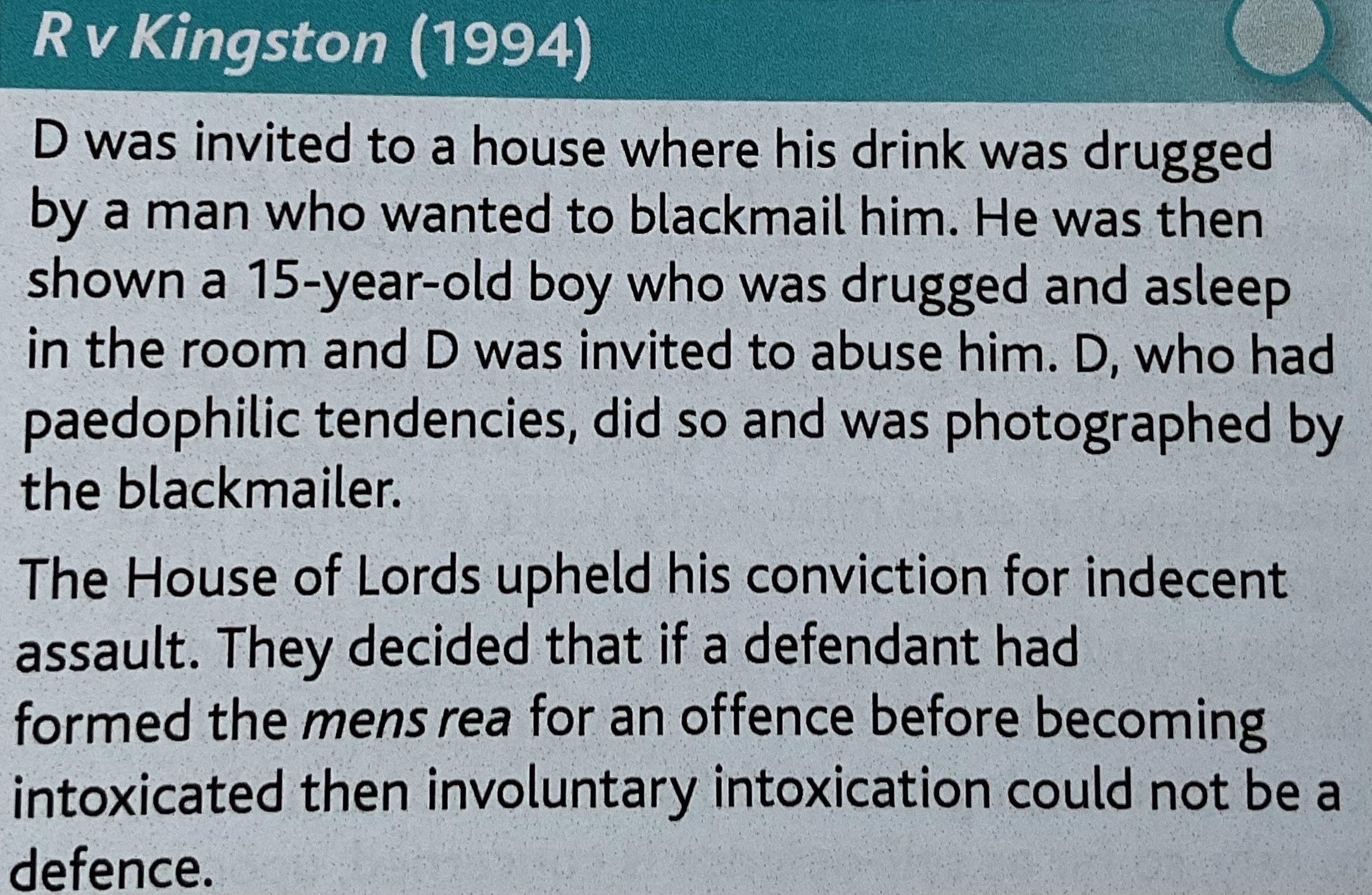
Intoxicated mistake
If the d is mistaken about a key fact bc they were intoxicated then it depends on what the mistake was about whether or not they have a defence.
If the mistake is about something which means that the d did not have the necessary men’s Rea for the offence then for specific intent they have a defense
If mistaken about another spect e.g the amount of force needed for self defense then d will not have a defense.
R v O’Grady 1987
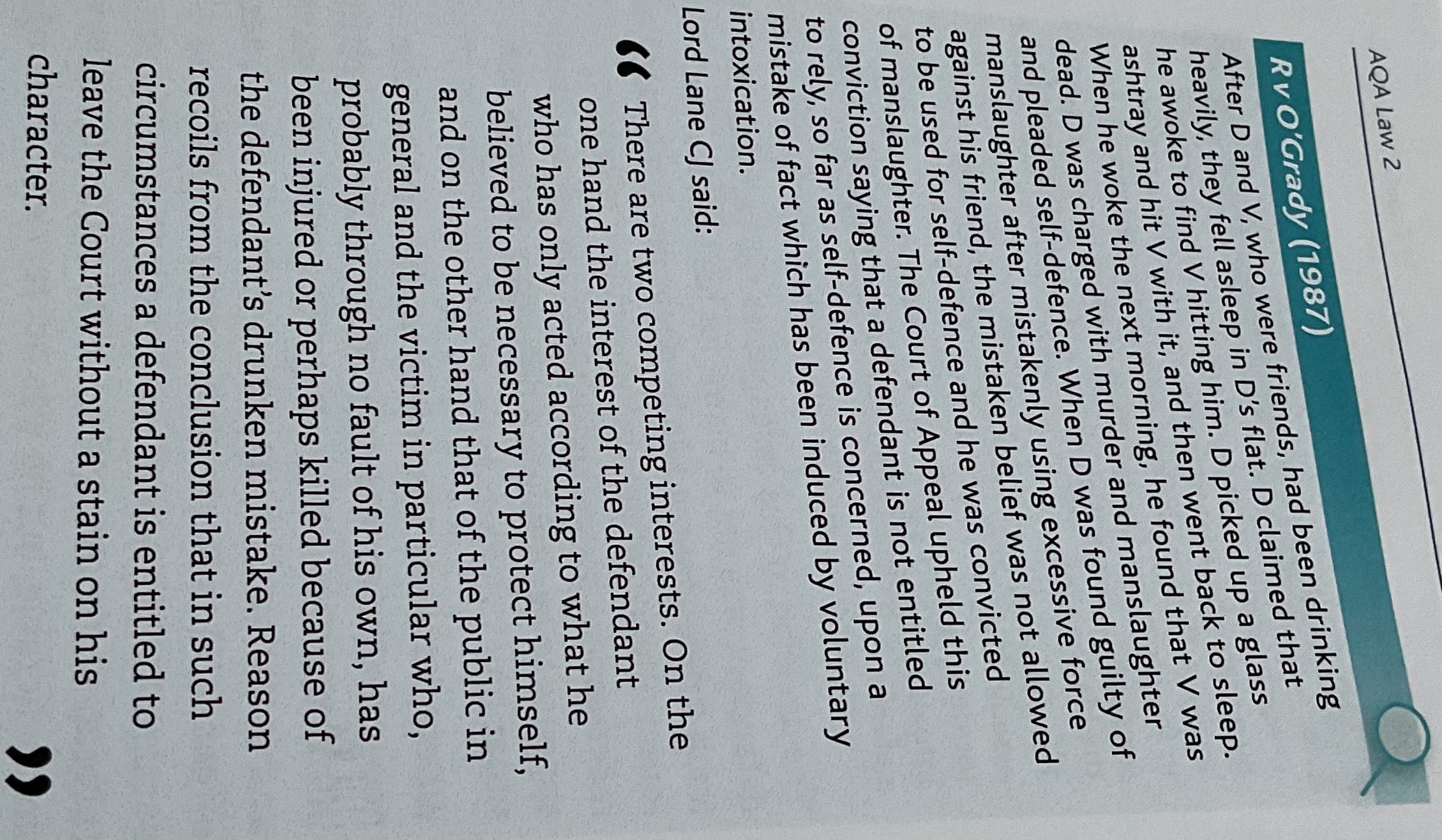
R v Hatton
Confirms that an intoxicated mistake to the amount of defense needed for self defence is not a defence to a specific intent offence
D had drunk over 20 pints of beer. He and another man went back to d’s flat. In the morning d claimed he found v dead from injuries from a sledgehammer. D said he could not really remember what had happened but thought that v had fit him with a five foot long stick and he had defended himself. D was convicted of murder. The court of appeal held that the decision in O’grady was not limited to basic intent offences. A drunken mistake about the amount of force required in self defence was not a defence.
M’naghten 1843
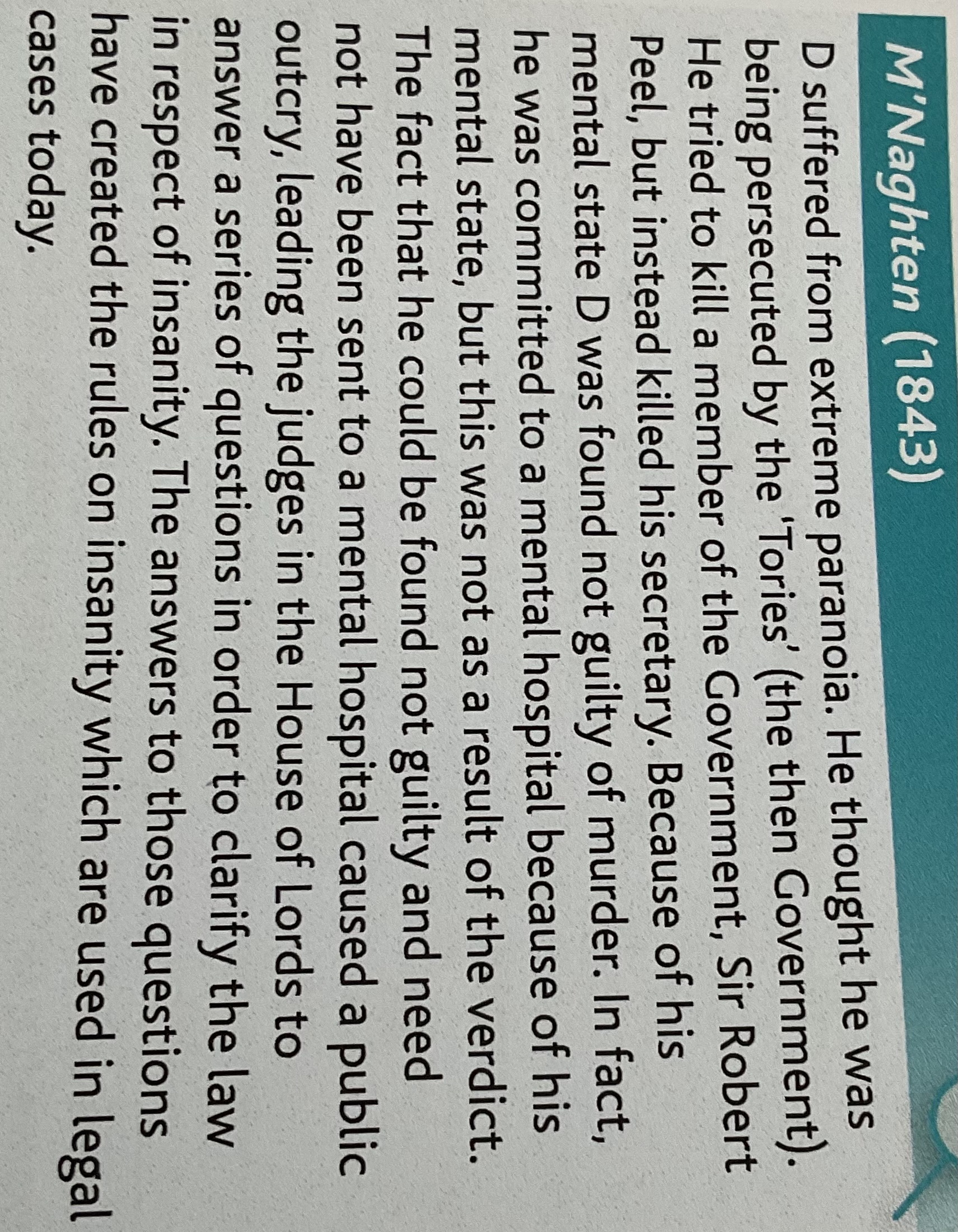
R v Clarke 1972
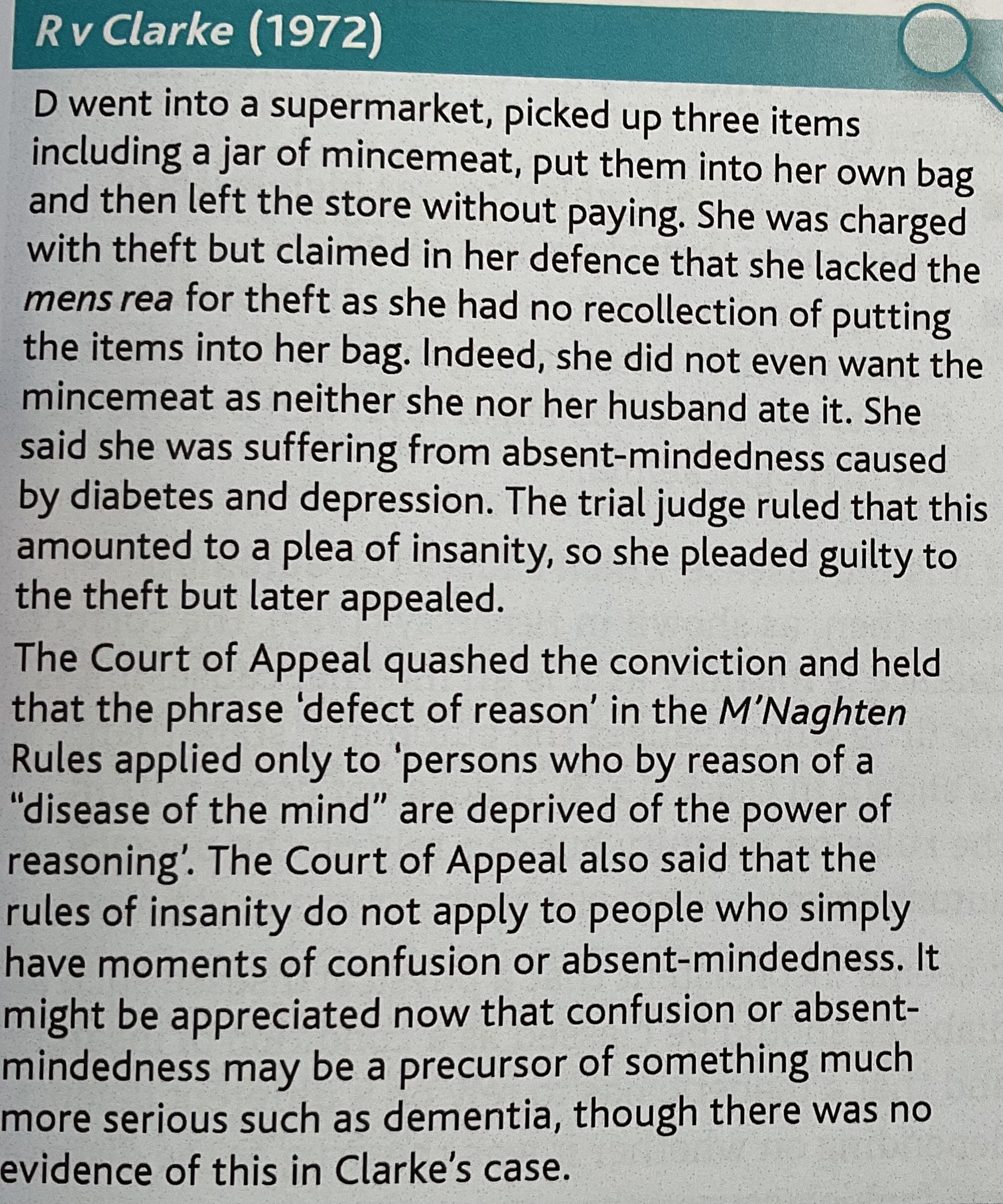
R v Kemp 1956
D was suffering from hardening of arteries which caused a problem with supply of the blood to his brain which caused d to have moments of temporary loss of consciousness. During one of these moments he attacked his wife with a hammer causing her serious injury. He was charged with inflicting grievous bodily harm under s 20 OAPA 1861. At his trail; the question arose as to whether this condition came within the rules on insanity. D admitted that he was suffering from a defect of reason but said that this was not due to a disease of the mind as it was a physical illness causing the problem and not a mental illness. He was found not guilty by reason of insanity and p appealed. The court of appeal upheld this finding stating that the law was not concerned with the brain but with the mind. Kemp’s ordinary mental faculties of reason memory and understanding had been affected and so his condition came within the rules of insanity.
R v Sullivan 1984
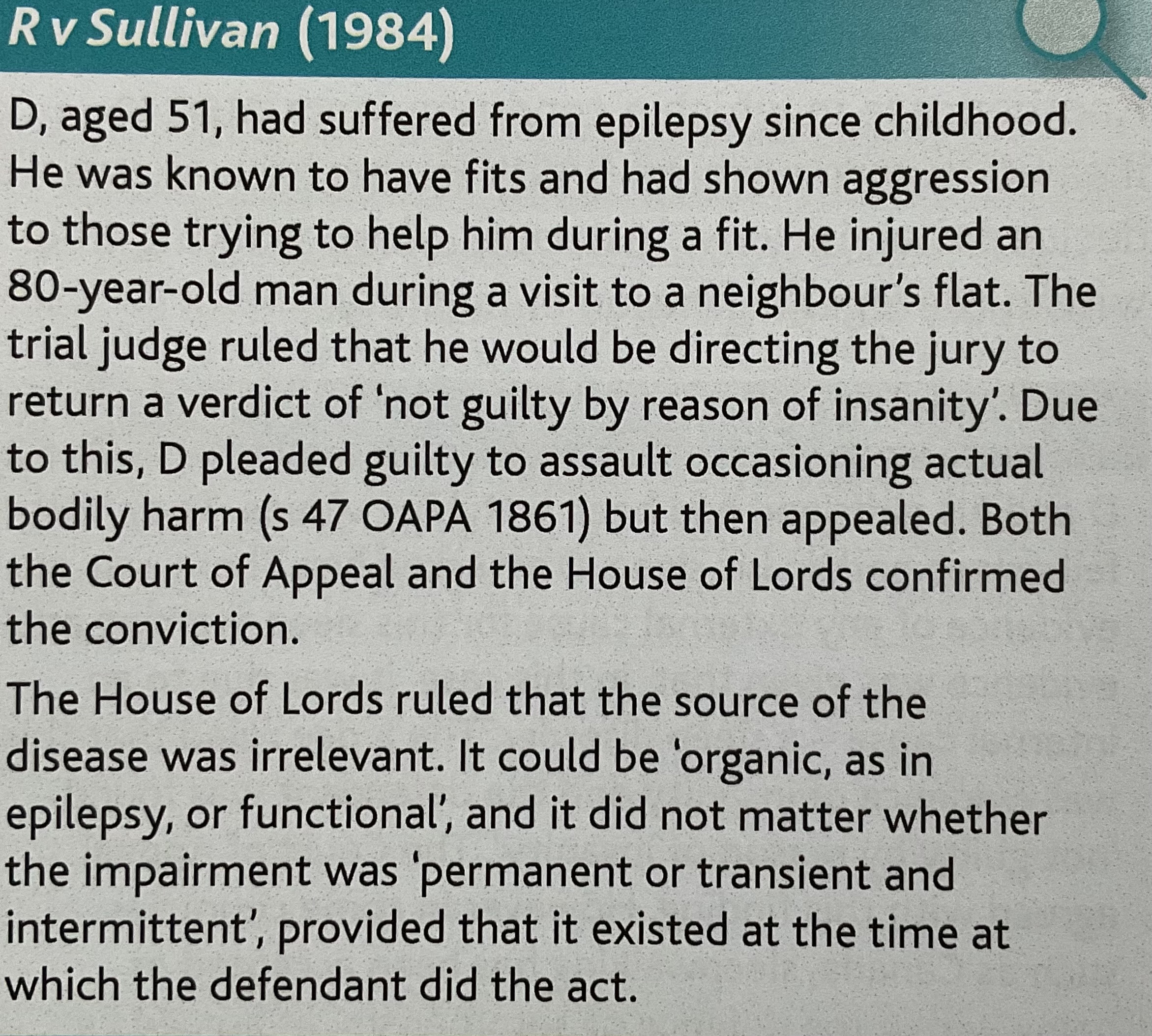
R v Hennessy 1989
D was a diabetic who had not taken his insulin for three days. He was seen driving a car which had been reported as stolen. He was charged with taking a motor vehicle without consent and driving while disqualified. He had no recollection of taking or driving the car. The judge ruled that d was putting forward a Defense of insanity the defendant wanted to use as a defense. D then pleaded guilty and appealed on the grounds that he should have been allowed to put forward the defense of non insane automatism. The court of appeal held that the correct defense was insanity as the diabetics was affecting his mind. As a result diabetes was brought within the definition of insanity.
R v Burgess 1991
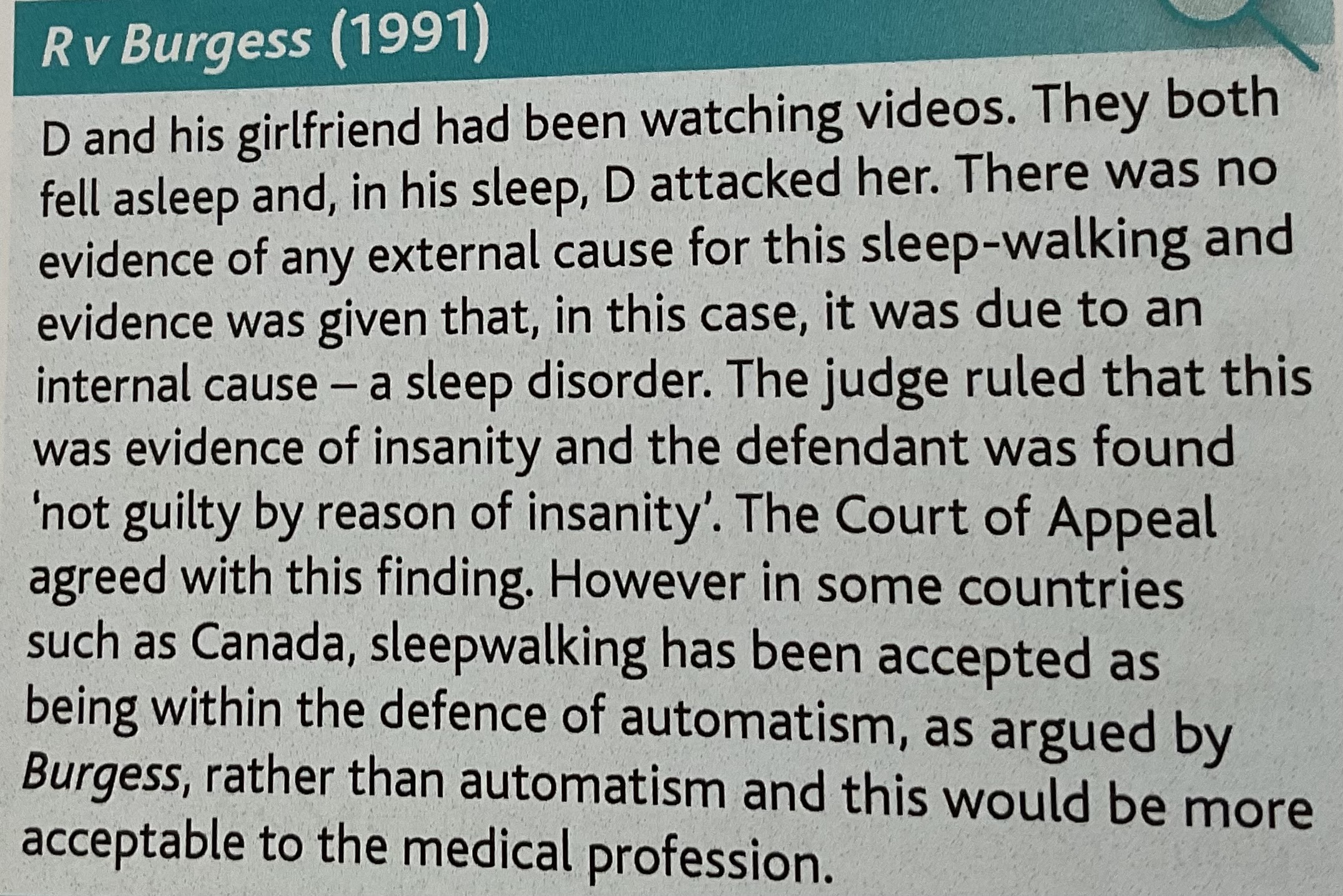
R v quick 1973
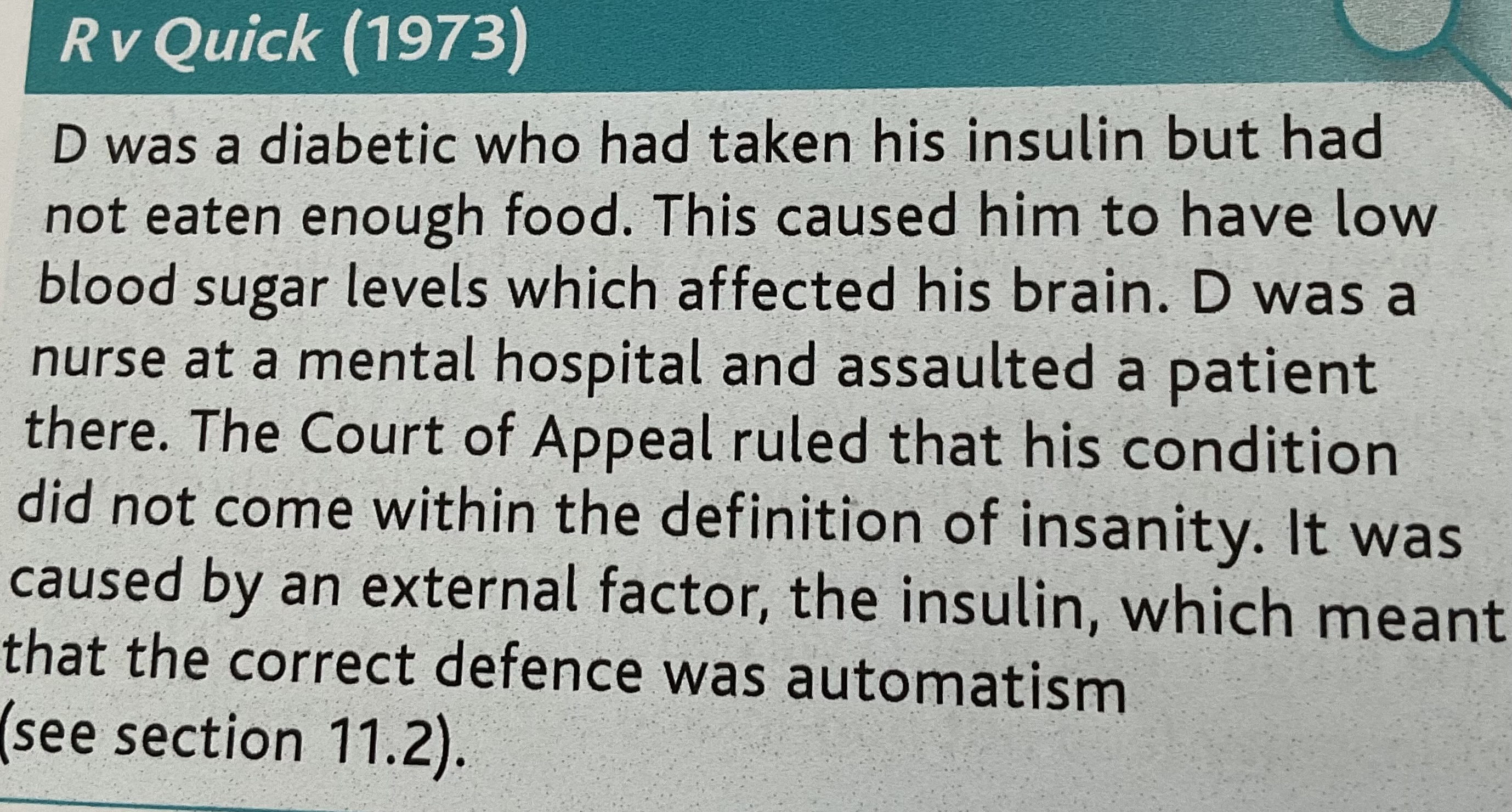
R v coley 2013
D aged 17 was a regular user if cannabis and one evening watched a violent video game. Later that night he entered a neighbours house and attacked her and her partner with a knife. When arrested he was calling for his mother and threatening suicide. He said he had blacked out and had no recolllection of what had happened. The psychiatric evidence was that he could have suffered a brief psychotic episode induced by taking of cannabis and that he might have been acting out the role of a character in the video game he had been playing. The judge refused to leave the defense of insanity to the jury and d was convicted of attempted murder. The court of appeal upheld the conviction as they considered his state of mind was caused by voluntary intoxication and it was not a case of insanity.
R v OYE 2013
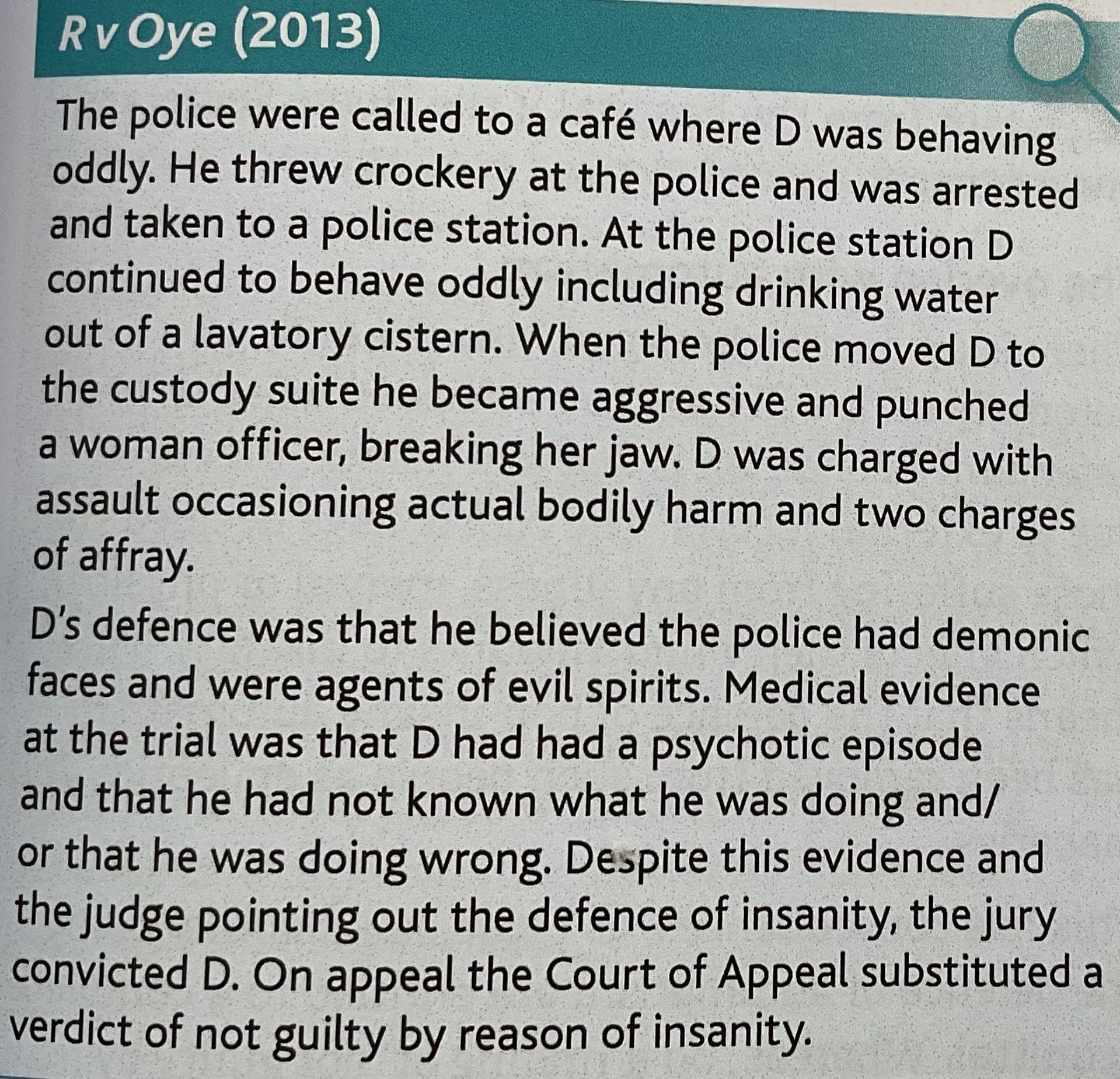
R v windle 1952
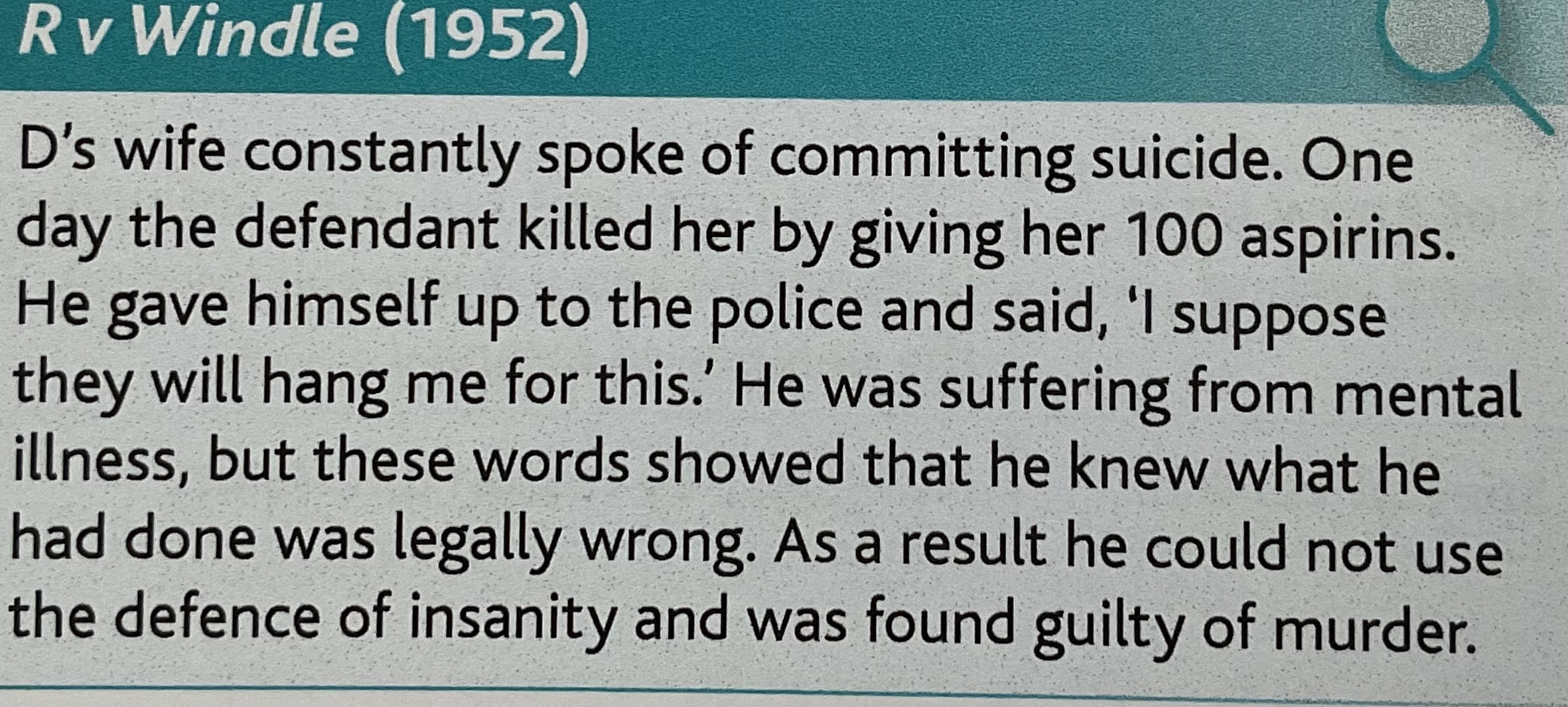
R v Johnson 2007
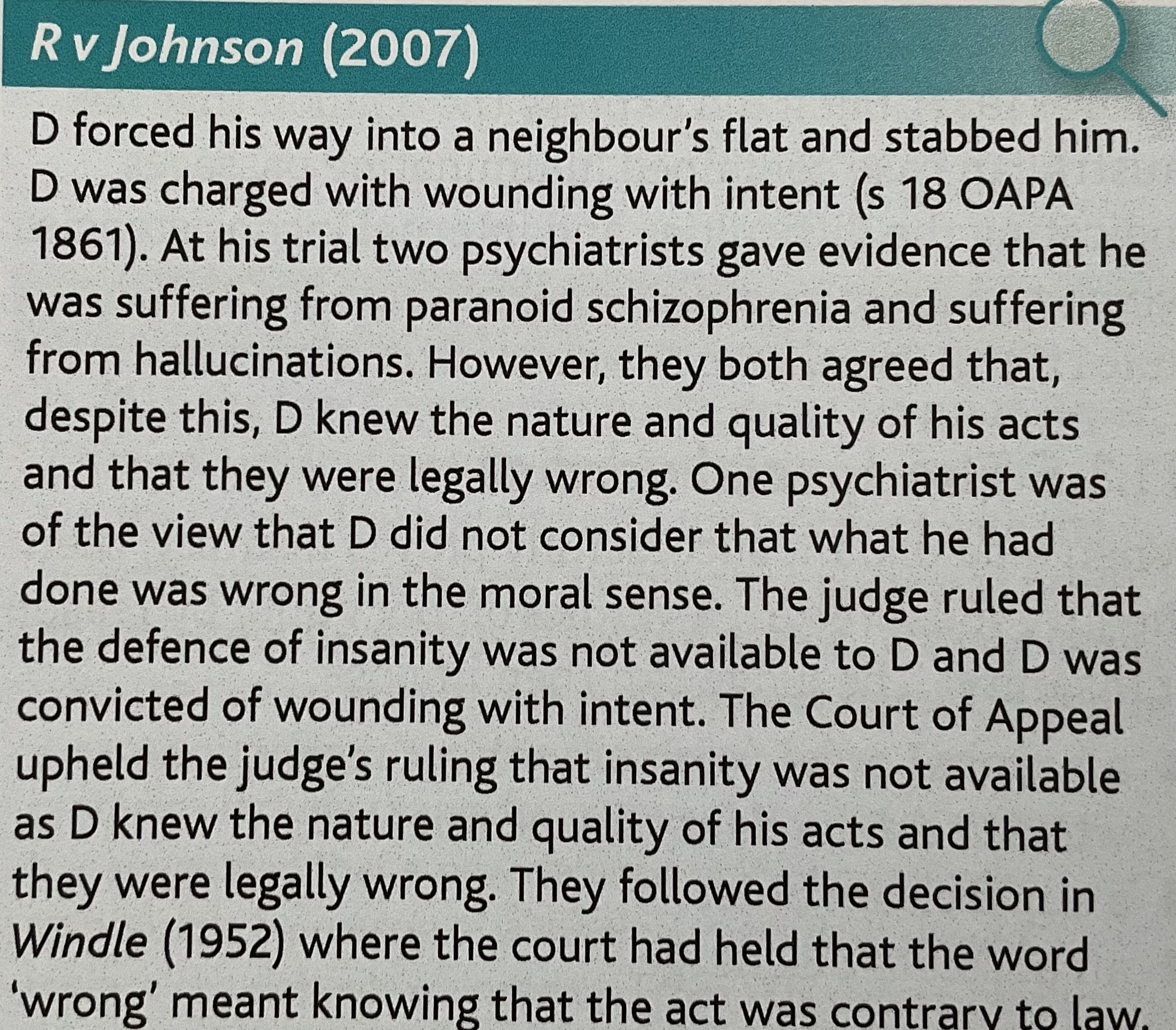
Haggard v Dickinson 1980
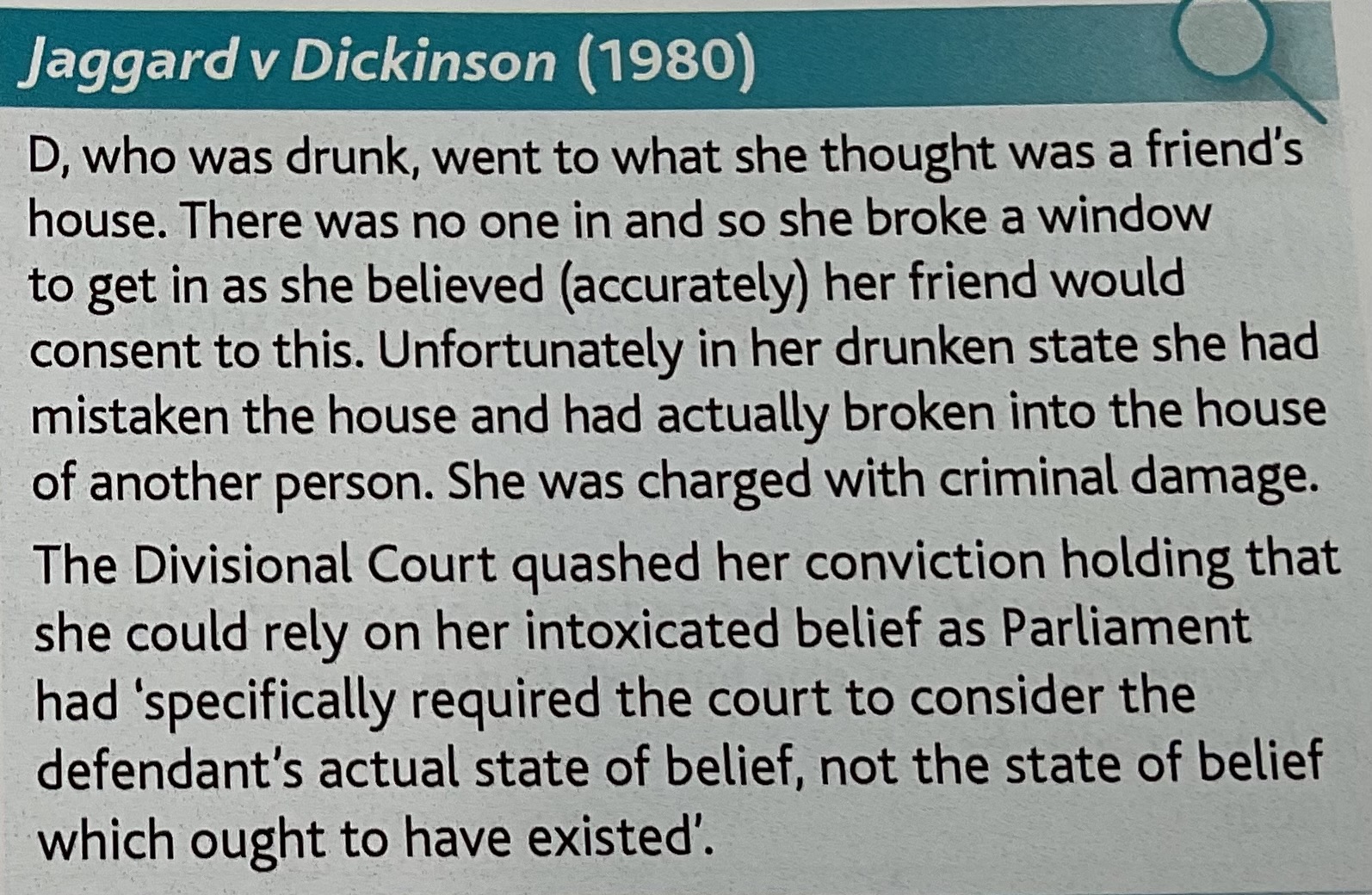
Criminal justice and immigration act 2008
A mistaken belief caused by voluntary intoxication cannot give a defense of self defense.